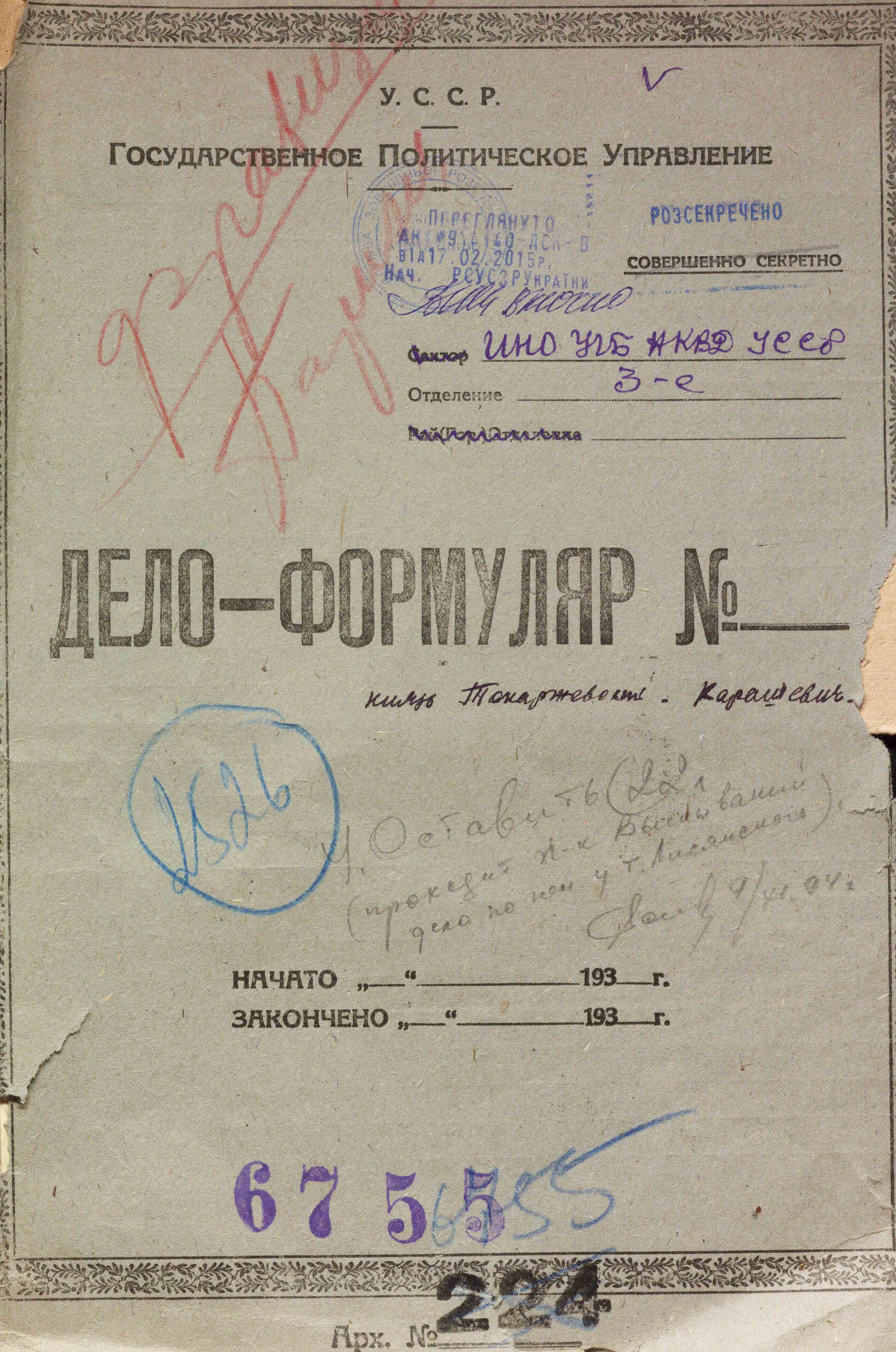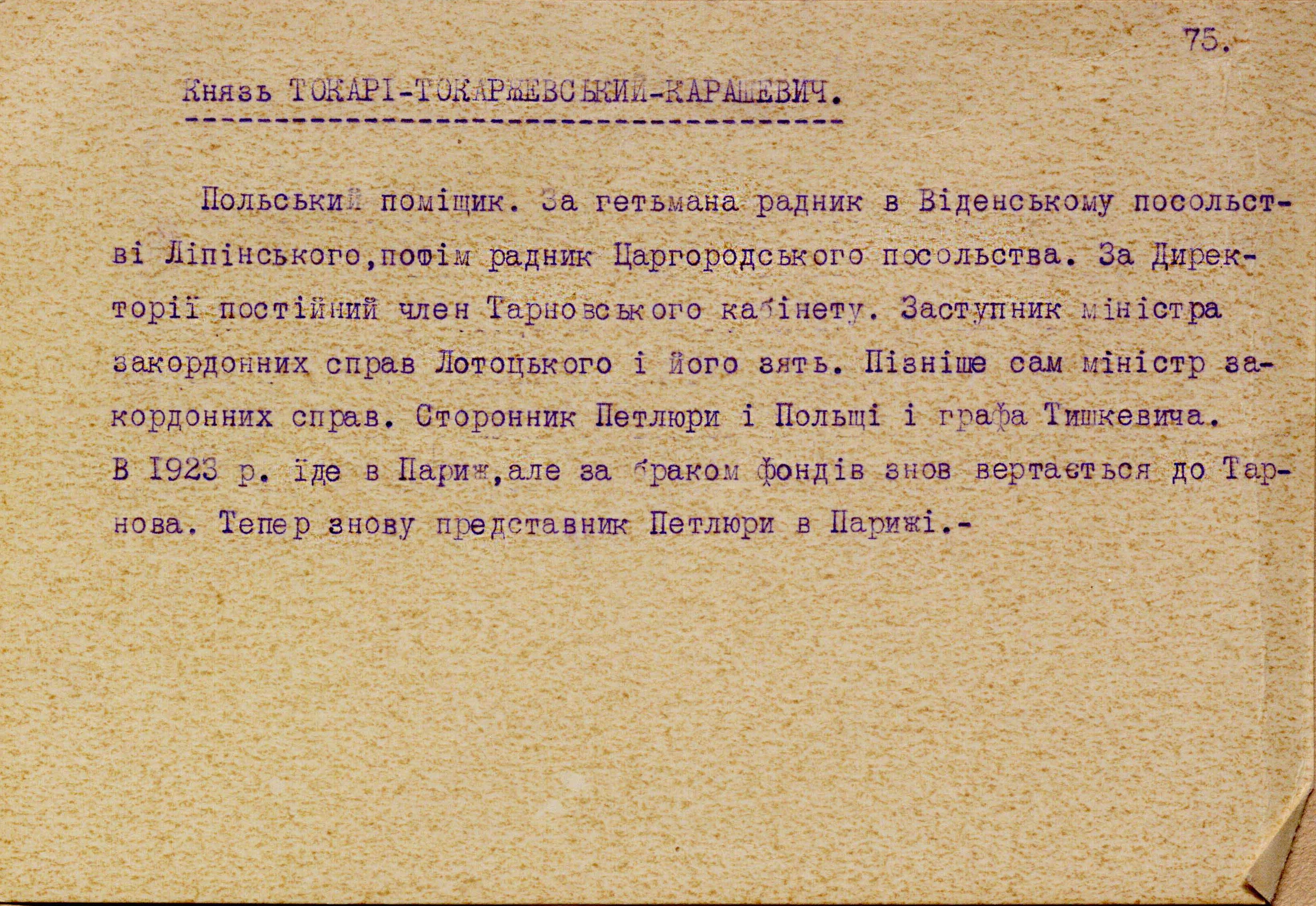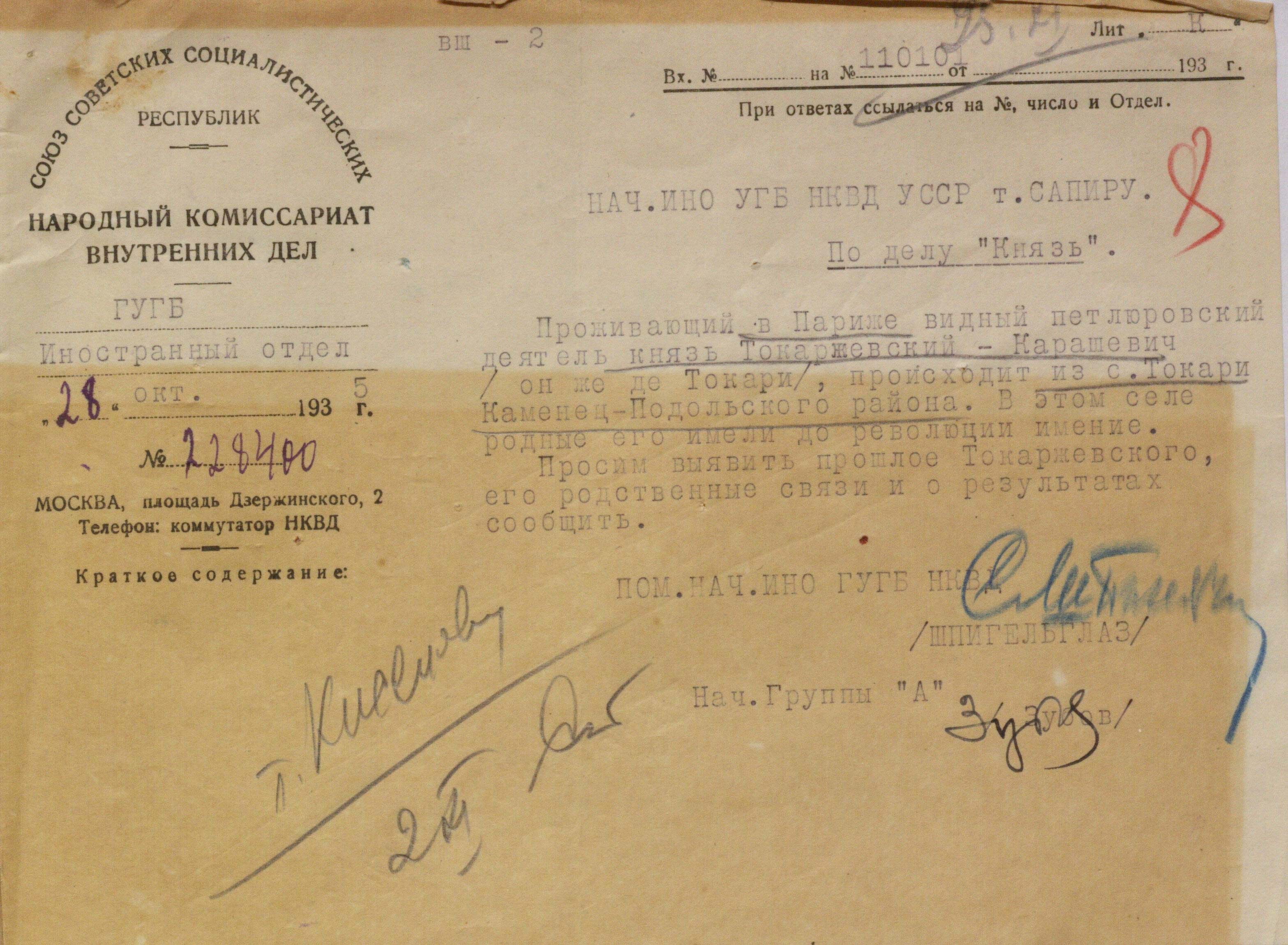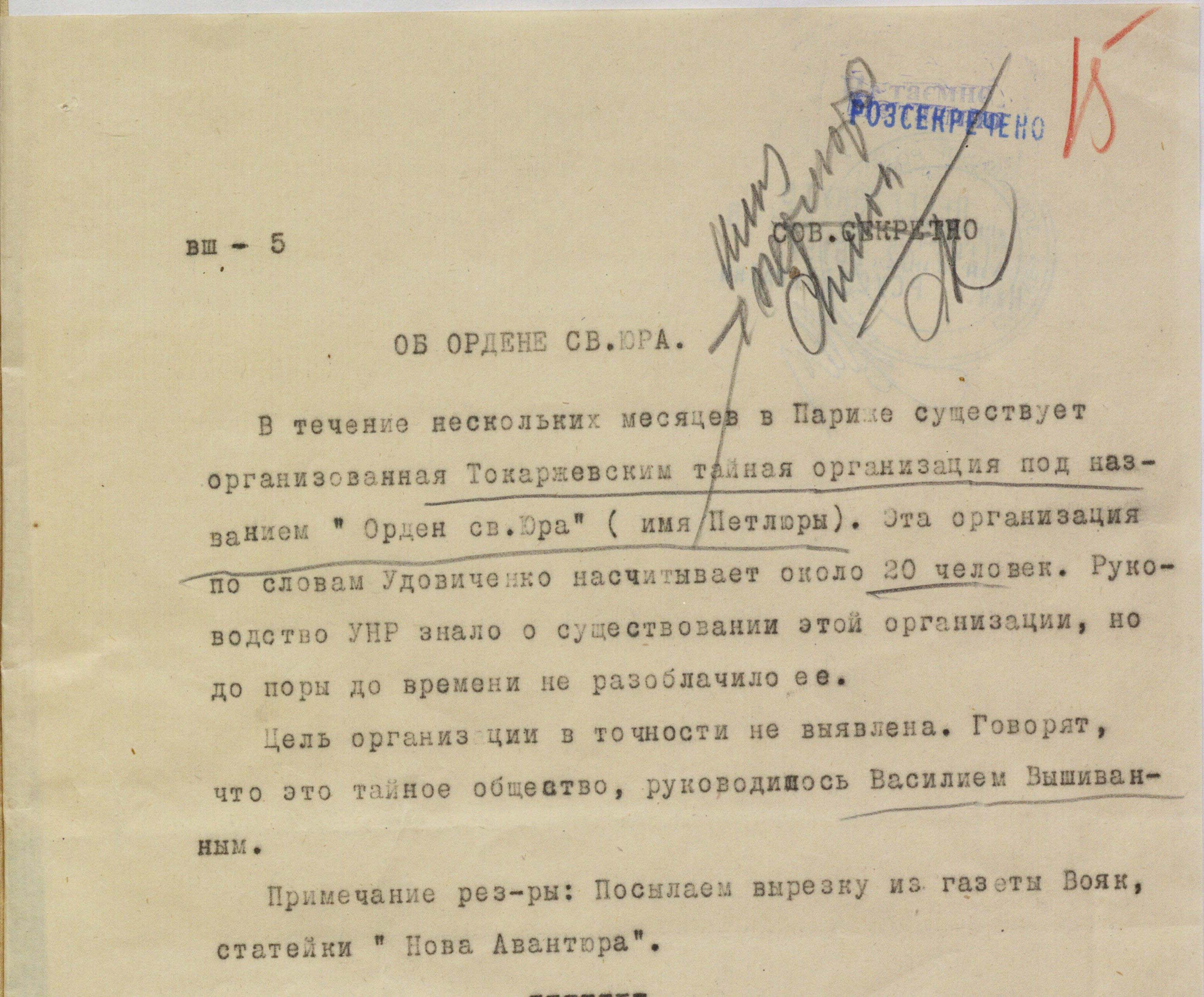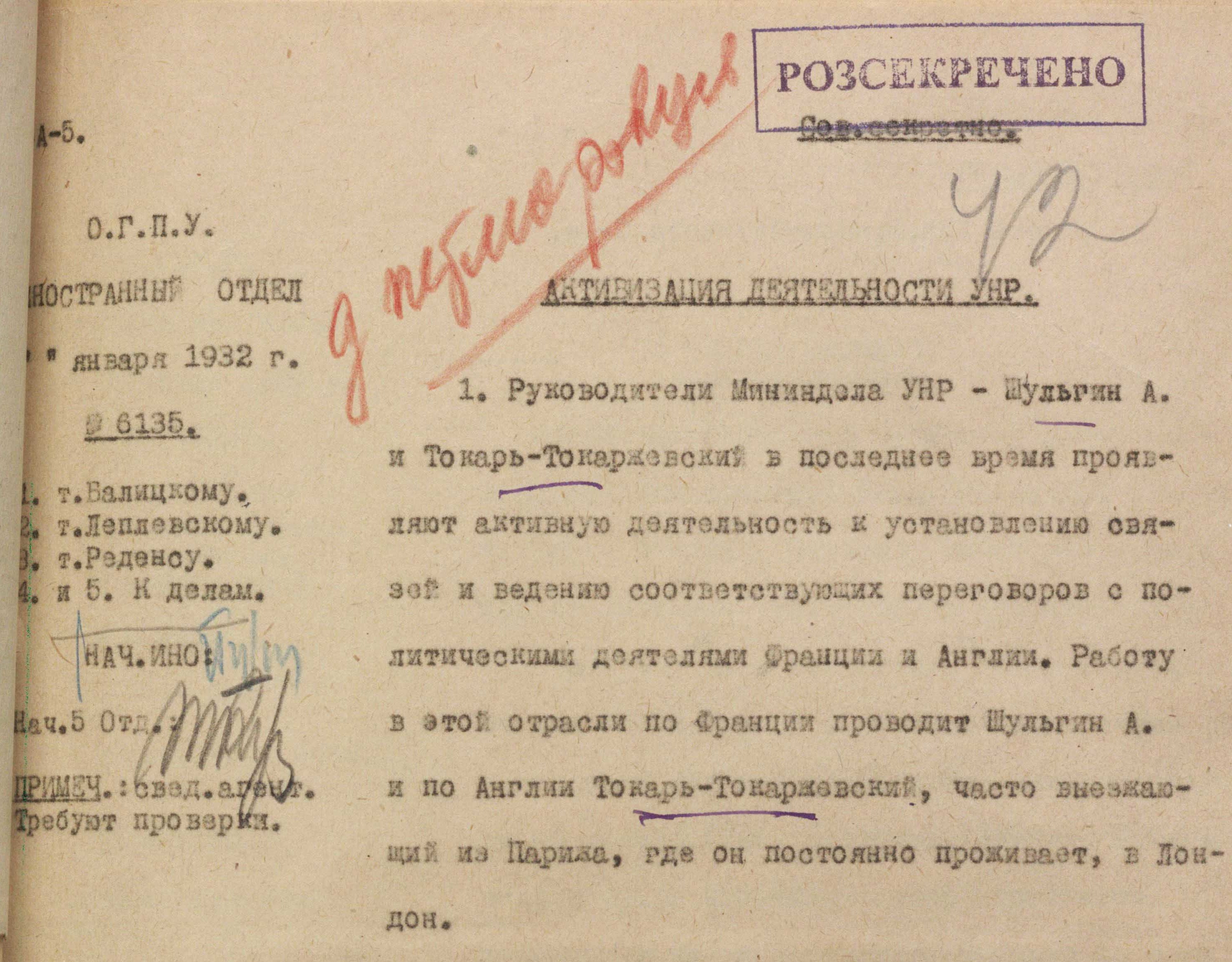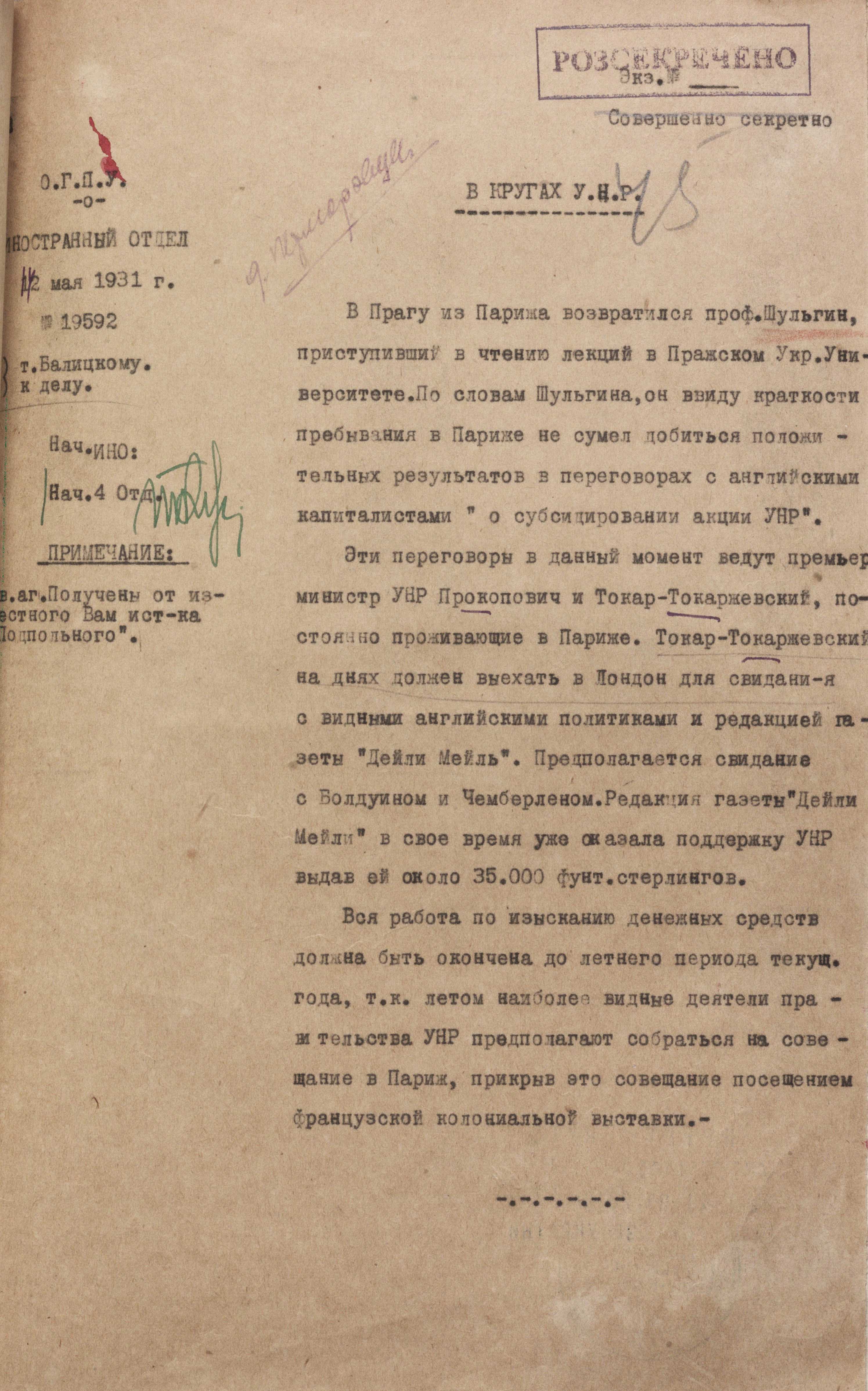A Knight of Malta – Subject to the nkvd’s operational cultivation
10/25/2024
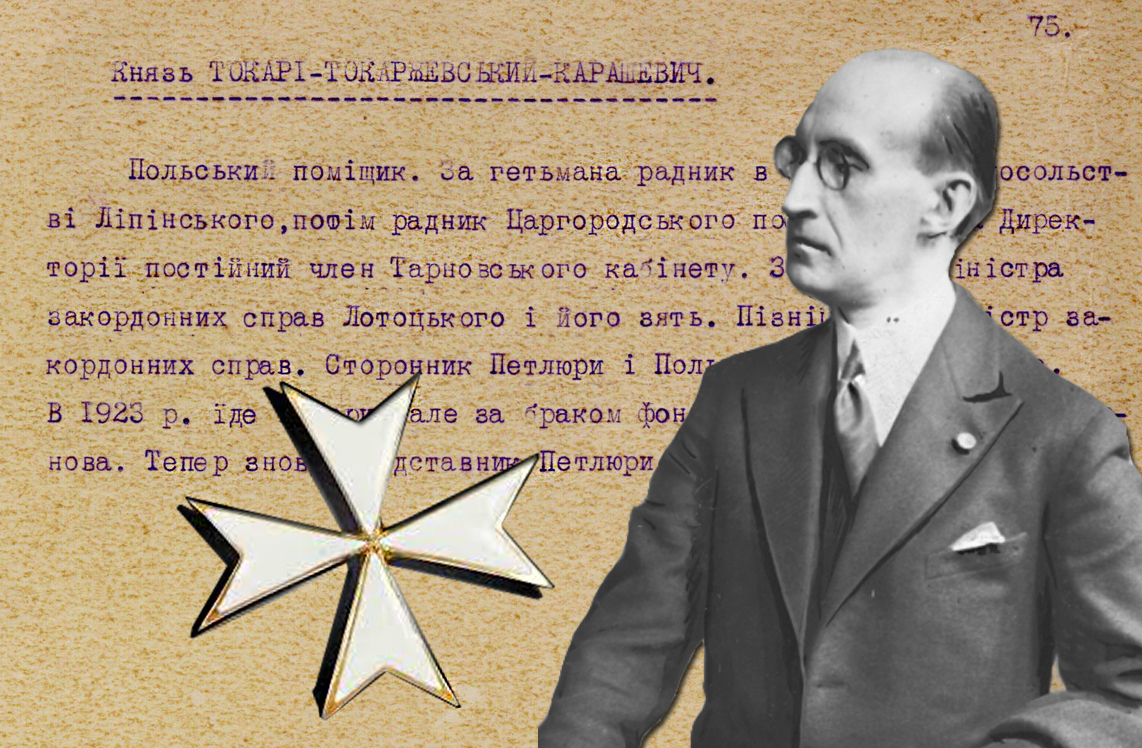
In the 1920s and 1930s, all prominent representatives of the national liberation movement involved in the creation of Ukrainian statehood, who did not stop fighting for the Ukrainian cause even abroad, were subjects to the gpu/nkvd’s operational cultivation. The chekists’ interest in the descendant of an ancient Lithuanian princely family, historian, diplomat, philosopher, and Ukrainian public and political figure Ivan Tokarzhevskyi- Karashevych (some publications spell his name as Jan Tokarzewski-Karaszewicz- Transl.) was no exception. This case also acquired a special color because the person was an Honorary Knight of the Order of Malta.
Ivan Tokarzhevskyi-Karashevych’s name appears in various case-files from the archives of the Foreign Intelligence Service of Ukraine, including those of diplomat Oleksandr Shulhyn, Ukrainian emigrants in France, Italy, England, and some others. In chekists’ documents, he appears as “Kniaz” (“Prince”- Transl.) Yan Tokarzhevskyi- Karashevych, Tokar-Tokarzhevskyi, de Tokari, and so on. The rare surname and several names given at birth caused some confusion in the cultivation. And constant moving from one country to another also posed significant obstacles to thorough tracking of his activities. At the same time, scattered documents allow us to understand, at least in fragments, what the stalinist secret services’ operational interest in him was based on.
The case file on I. Tokarzhevskyi- Karashevych was opened by the nkvd in the mid-1930s. At that time, he lived in France (from 1924 to 1936) and tried to be useful to the Ukrainian cause. He was a member of the France-East Committee, and an editor of the La France et l'Ukraine bulletin, Secretary General of the French Society of Ukrainian Studies. He wrote for various journals, and lectured on historical topics.
The chekists never managed to compile a more or less detailed biographical profile on him. His case file contains only brief information of the following content: “Kniaz Tokari-Tokarzhevskyi. Polish landowner. Under the Hetman, he was an Advisor to Lypynskyi’s Embassy in Vienna, then an Advisor to the Embassy in Constantinople. Under the Directory, he was a permanent member of the Tarnov Cabinet. Foreign Minister Lototskyi’s Deputy and son-in-law. Later he himself was the Minister of Foreign Affairs. A supporter of Petliura, Poland, and Count Tyshkevych. In 1923, he went to Paris, but due to lack of funds, he returned to Tarnov. Now he is again Petliura's representative in Paris” (BSA of the SZR of Ukraine. - F. 1. – Case 6755. - P. 2).
Apart from this, the chekists had information from foreign agents that he allegedly came from the village of Tokari in Kamianets-Podilskyi district. This confusion was facilitated by the work “The Diary of Hetman Pylyp Orlyk,” published in 1936 in Warsaw. On its cover there was the following inscription: “Prepared for publication by Jan z Tokar Tokarzhevskyi- Karashevych”. This led to the erroneous conclusion that he came from the village of Tokar or Tokari. Therefore, in a series of inquiries, they insisted on finding that village in Podillia and providing information about his family and friends. But never received anything because there was no such village in the area. Nor could they get information about close relatives in the Ukrainian SSR, through whom to intensify his cultivation.
The truth is Ivan Tokarzhevskyi- Karashevych was born on June 24, 1885, in the village of Chabanivka, Ushytsia district (now Kamianets-Podilskyi district, Khmelnytskyi region). He came from an ancient Lithuanian noble family connected with Ukraine since the 14th century. Having graduated from the First Zhytomyr Gymnasium, he studied philosophy and political science at the universities of Freiburg, Vienna, Munich, and Toulouse, and received a doctorate in philosophy and political science. In 1910 – 1918 he lived in his native village managing his estates. During the First World War, he worked for the Red Cross organizations.
With the beginning of the national liberation struggle, he sided with the UPR. In 1918, Hetman Pavlo Skoropadskyi appointed Tokarzhevskyi-Karashevych as an Advisor to the Ukrainian Embassy in Vienna. In the summer of 1919, the diplomat was transferred to the Constantinople Embassy. Later, he was appointed Charge d'Affaires, and from May 1920 he headed the Embassy as Ambassador Extraordinary and Minister Plenipotentiary. In 1922, he became Vice Minister of Foreign Affairs and headed the Ministry of the State Center of the Ukrainian People's Republic in exile. In September 1924, he left this position and moved to France.
It was in France that the residentura of the nkvd began to file s dossier on him. The documents state that he is a prominent Petliurist, a close associate of the Minister of Foreign Affairs of the Ukrainian People's Republic Oleksandr Shulhyn, knows several foreign languages, and has extensive contacts among foreign diplomats.
The ogpu of the ussr’s document dated January 1932, entitled “Activation of the UPR's Activities”, states that O. Shulhyn, together with I. Tokarzhevskyi-Karashevych, became more active in establishing contacts with representatives of leading European countries in the issue of providing assistance to the Ukrainian liberation movement. I. Tokarzhevskyi-Karashevych, in particular, directed his efforts to England.
Another document states that Prime Minister of the UPR Viacheslav Prokopovych and former Minister of Foreign Affairs of the emigrant government, Yan Tokarzhevskyi-Karashevych, “are negotiating with English capitalists to subsidize UPR shares”. To this end, Tokarzhevskyi-Karashevych is to “travel to London to meet with prominent English politicians and the editorial board of the Daily Mail. He is supposed to meet with Baldwin and Chamberlain. The editorial board of the Daily Mail newspaper has already supported the UPR by donating about 35,000 pounds sterling” (BSA of the SZR of Ukraine. - F. 1. – Case 6687. - Vol. 1. – P. 45).
The nkvd also did not like I. Tokarzhevskyi-Karashevych’s reaction to the assassination in the ussr in 1934 of first secretary of the leningrad city committee of the cpsu, organizer of mass repressions, sergei kirov. “At last we have lived to see the murder of a prominent bolshevik”, reads one of the documents, citing a foreign agent. “This is not the end of the matter. The terror that is currently being carried out in the union, in particular in Ukraine, will cause a number of acts of popular discontent” (BSA of the SZR of Ukraine. - Vol. 1. - Case 6755. - P. 5).
Another paper, dated April 1935, refers to the intensification of the UPR’s work among young people in France. It points out that I. Tokarzhevskyi-Karashevych began organizing the Union of Ukrainian Patriotic Youth. According to the organizers, the Union was to consist of three sections: cultural and educational, military, and organizational. It was to unite all young people in exile in the spirit of patriotism. “Tokarzhevskyi's conclusion”, says the document, “is that it is time to take more active actions in the struggle against the bolsheviks, the enemy is getting stronger every day, and we must intensify our work” (BSA of the SZR of Ukraine. - Vol. 1. – Case 6755. - P. 1).
All this information, put together, gave grounds to intensify the operational cultivation of I. Tokarzhevskyi-Karashevych himself. Having learnt that he had created a secret organization in Paris called the Order of St. Yuriy, the leadership of the nkvd showed even greater interest in his person.
“For several months”, reads one of the documents, “a secret organization created by Tokarzhevskyi and called the Order of St. Yuriy (Petliura's name) has been operating in Paris. This organization... has about 20 members... The aim of the organization is not clear. This secret society is said to be led by Vasyl Vyshyvanyi” (BSA of the SZR of Ukraine. - Vol. 1. - Case 6755. - P. 15).
Other documents mention that I. Tokarzhevskyi- Karashevych traveled to Rome, where he also summoned Vyshivanyi to meet him. There, they were busy resolving the Ukrainian issue, meeting with highly respected Italians, and allegedly hoping for some success from those negotiations.
The chekists failed to collect any more information about that secret organization. At the same time it is known that I. Tokarzhevskyi-Karashevych was an Honorary Knight of the Order of Malta, a Catholic monastic order of crusading Hospitallers with a thousand-year history, a separate sovereign status, charitable traditions, and special membership. Kniaz I. Tokarzhevskyi-Karashevych had a great reputation in international scientific and diplomatic circles. He was a member of the board and chairman of the council of the International Heraldic Institute. After moving to Italy in 1936, he mastered the Italian language, worked extensively in Italian archives and libraries, and wrote for various Italian magazines. He was the secretary of the editorial board of the monthly of the Order of Malta. However, the chekists viewed his involvement in this international organization only as something that could be used in anti-soviet activities.
In general, the period of I. Tokarzhevskyi-Karashevych’s residing in Rome with his wife in 1936-1948 is vaguely reflected in archival documents. And so is his further life in the United Kingdom, where he focused on the problems of liberating the peoples enslaved by moscow, Ukrainians included. He was a member of the Central Committee of the Anti-Bolshevik Bloc of Peoples and the head of the ABP’s Delegation to the United Kingdom, a regular contributor to the “Vyzvolnyi Shliakh” (“Liberation Path”) journal, in which he published political and historical articles. Perhaps due to this frequent change of residence and lifestyle, he managed to avoid too thorough cultivation by the nkvd/mgb and, as a result, recruitment approaches or operational measures to discredit and compromise him.
I. Tokarzhevskyi-Karashevych passed away on November 18, 1954. On July 7, 1978, he was reburied at the Ukrainian Pantheon in Bound Brook, New Jersey (USA).
